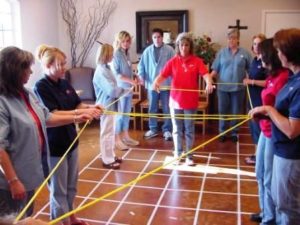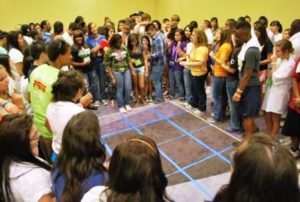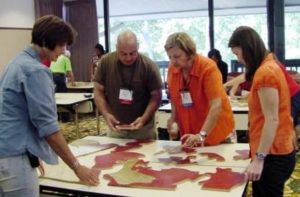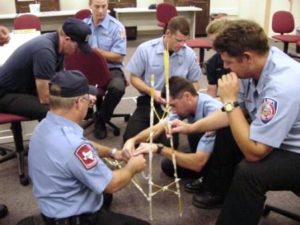
Mitchell uses pure or guided facilitation to get the results your team desires. He utilizes experiential activities to help your team discover how they work (or don’t work) well together.


Mitchell brings UNITY to your community.
Communication is key. Planning is necessary. Member buy in and accountability is essential.
“If there is no buy in, there is no need in trying” exclaimed one member during a staff development retreat!
Mitchell has facilitated training and retreats for staff team building, executive leadership development, student led-adult assisted project planning, non-profit board annual strategic planning, manager employee performance, emergency response units, and many, many, many other topics.


How can I serve your group?
“One Team- One Fight”
Mitchell recently facilitated planning sessions for the PDO (Prescription Drug/Opioid Overdose) & STR (State Targeted Response) to the Opioid Crisis Grants in Arkansas.
After a complete review of the needs assessment, Mitchell facilitated discussion with the Advisory Council and upon completion developed and submitted a statewide strategic plan for review to help reduce the Opioid crisis in Arkansas.
Mitchell began the meeting with a definition of Addiction- “Addiction is defined as a chronic, relapsing brain disease that is characterized by compulsive drug seeking and use, despite harmful consequences.”
Mitchell then suggested we begin with “why” before we answer “who, will do what, when”.
Members spoke about people they personally knew who had become addicted or had died from this disease. Members also spoke about the devastating impact it has upon families and communities and how preventing this disease from occurring is vital to the behavioral health of the State of Arkansas.
Mitchell facilitated discussion for the Prescription Drug/Opioid Overdose grant in the following areas:
SWOT Analysis: (Strengths, Weaknesses, Opportunities, Threats)
- What is already in place and where improvements could be made
- Areas to improve and existing opportunities
- Challenges and threats to current and proposed plans
Identify and prioritize risk factors:
- Prioritized risk factors in the three high needs communities
Create solutions for current identified problems:
- Brainstormed statewide solutions
- Identifying road blocks to the communities receiving these suggested plans and discussed solutions
- How to help communities with the current request for Naloxone rescue kits
Develop a comprehensive prescription-drug misuse prevention program in order to:
- Reduce the number of prescription drug/opioid overdose-related deaths and adverse events among Arkansans 18 years of age and older
- Address behavioral health disparities among racial/ethnic minorities
- Replicate a successful local police department Naloxone program
Action Items: Invite 2-3 “Community Champions” from each of the target areas to join the Advisory Council, view and finalize this strategic plan
For the STR grant Mitchell facilitated discussion for in the following areas:
SAMHSA STR Expectations
STR Needs Assessment
- Identify areas of concern
SWOT Analysis: (Strengths, Weaknesses, Opportunities, Threats)
- What is currently in place
- Areas to improve and existing opportunities
- Challenges and threats
Arkansas STR Grant
- Details, Priority Populations, Goals, Implementation plan
Gaps and Solutions
- Gaps in prevention, treatment, and recovery identified in the needs assessment.
The great State of Arkansas, under the leadership of Drug Director Kirk Lane, is ready to move forward to reduce the number of prescription drug/opioid overdose-related deaths and adverse events among Arkansans.
“One Team- One Fight”